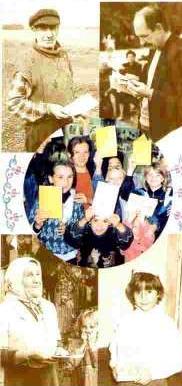 |
|
 |
|
**List: Romany Ministry the Bible ( the Bible )
ROMMANY, OR SPANISH-GIPSY.--1860 S. Bagster [Info only: n.d. Luke 6:27-38 unknown.]
|

Romany Bible History (3) 
**List: Romany Ministry
the Bible ( the Bible )
Romany...
ROMMANY, OR SPANISH-GIPSY. "I.--DIFFUSION AND STATISTICS. THE vagrant tribes known in England by the name of Gipsies wander in hordes or companies about
the plains of Asia, and in certain parts of Africa, as well as in most of the countries of Europe.
Without historical records, without traditions, without even a religion of their own, they are bound
together by national habits and customs, by the love of an unsettled life, and by a peculiar language;
and, like the Jews, they exist from generation to generation as a separate people in the midst of many
nations. In Germany they are called Zigeuner, as if from the Sigyuni mentioned by Herodotus as
living on the banks of the Danube; in Russia, Zigáni; in Turkey and Persia, Zingarri, probably acorruption of Tchingani or Zingam, the name of a predatory race inhabiting the tract of land near
the mouth of the Indus; and these various appellations, all apparently springing from the same etymon,
may, it has been conjectured, be radically the same as the term Zincali, by which they sometimes
designate themselves; a term compounded of two words, and supposed to signify the black men of
Zend, or Ind. The English name Gipsy (from E-gypt-ian) and the Spanish Gitano, arose from a
notion once currently entertained respecting the Egyptian origin of this singular people, from whence
perhaps they derive their name Roma, from Romi, in Coptic "a man." In France they are still called
Bohémiens (Bohemians), either because they first entered that country from Bohemia, or else from the
old French word böem, a sorcerer, in allusion to the arts they have so long exercised in practising
upon the credulity of the vulgar. They have been known in Europe only since the beginning of the
fifteenth century. The most severe legislative enactments have at various times been framed against
them, on account of their inveterate habits of petty depredation; yet no degree of persecution has ever
succeeded in effectually diminishing their numbers, or in driving them from countries into which they
have once introduced themselves. Grellman computed that in his time the number of Gipsies through-
out Europe amounted to between 700,000 and 800,000, of whom, he said, 40,000 were located in
Spain, chiefly in the southern provinces. Mr. Borrow likewise is of opinion that there are at the
present moment about 40,000 Gipsies in Spain, but he considers that they were formerly considerably
more numerous in that country. There are also great numbers of Gipsies in Hungary and Tran-
sylvania, where they are extensively employed in washing gold from the sands of the rivers, and
occasionally in other avocations. The Gipsies at present dispersed through England are supposed to
number about 20,000.II.--CHARACTERISTICS OF THE DIALECT. In default of all historical evidence concerning the proper country of the Gipsies, their dialect
indicates with tolerable distinctness that their origin is to be traced to India. Their physical
conformation, their complexion, and their peculiar mode of life, furnish additional proofs of their
Indian descent; for Captain Richardson has shown that in these points they bear a very strong resem-
blance to a sort of people in India called Bazeegurs; and many writers have attested that in these and
other respects they may well be compared to the lowest caste of Hindoos, particularly to certain thievish
castes, who to this day are to be found in various parts of India. To account for their sudden appear-
ance in Europe, Adelung conjectured that they fled thither to escape the cruel war of devastation
carried on by Tamerlane, in 1408-9; but this hypothesis rests on very insufficient data; and it is
equally reasonable to suppose that they may have left their country either to evade the laws they
had outraged, or in pursuit of farther plunder.
The language still spoken by the Gipsies in all the countries through which they are dispersed is
a dialect of the Sanscrit: it is called Rommany, from rom, a husband, or a man; and so close is its
affinity with other Indian dialects, that it is by many considered as little else than a corrupt form of
Hinduwee. It is related of Lord Teignmouth, the first president of the British and Foreign Bible
Society, that one day chancing to meet with a Gipsy woman, he was struck with her resemblance in
form and feature to the natives he had been accustomed to see in India. He addressed her in Hindustani,
with which language he was familiarly acquainted, and found to his surprise that she could perfectly
understand him. He then invited her and several of the members of her tribe to his house, and
induced them to pronounce a number of words in Rommany, which he carefully noted down: many
of these words he discovered to be purely Hindustani, while others were obviously derived from
Sanscrit roots. But although the idioms, and almost all the words of the Rommany, are unquestionably
of Indian extraction, it has also adopted terms belonging to other families of languages. Several
Sclavonic words, for instance, are to be detected in Rommany; and this circumstance seems to have
arisen from the Gipsies, in their migration from the East, having passed through the steppes of Russia,
where many of the tribe are still to be met with. Modern Greek words, probably learnt during theirpassage through Bulgaria, are also occasionally to be heard in their language; and still more abundant
is the intermixture of Persian words. The languages of the other countries in which the Gipsies have
established themselves have had more or less influence in the modification of Rommany. In Spain,
its grammatical peculiarities have entirely disappeared; its syntax, its declension of nouns, its conju-
gation of verbs, being all subjected to the rules of Spanish grammar. In Hungary and Transylvania
it is spoken with tolerable purity; and in England the idiom has suffered far less modification than in
Spain, for the English dialect of Rommany still retains its original syntax to a certain extent, and its
peculiar methods of conjugation and of declension.III.--VERSIONS OF THE SCRIPTURES IN THIS DIALECT. The whole of the New Testament has been translated into the Spanish dialect of Rommany by
Mr. Borrow, who during a long course of years had opportunities of familiar intercourse with the
Gipsies, never obtained before or since by any individual unconnected with the race. Determined
that this neglected people should understand the Gospel, Mr. Borrow proposed that they should them-
selves translate it. With this view he assembled some of the Spanish Gipsies together, and commenced
with the Gospel of St. Luke, they rendering into Rommany the sentences which he delivered to them
in Spanish. They proceeded in this way as far as the middle of the eighth chapter, when Mr. Borrow
found it necessary to complete the translation himself, supplying deficiencies from a version which he
had commenced at Badajoz in 1836. He printed 500 copies of this Gospel at Madrid in 1838; it was
the first book that had ever appeared in Rommany. Copies of the work were so eagerly sought by
the Gitanos of Madrid, that Mr. Borrow remarks he could readily have disposed of the whole edition
in a fortnight, had it not been for the opposition to its circulation excited by the clergy immediately
on its publication. "Sorcery!" exclaimed one bishop. "There is more in this than we can dive
into," said a second. "He will convert all Spain by means of the Gipsy language," said a third.
In compliance with their entreaties, the Corregidor, or Gefe politico, of Madrid gave orders for the
seizure of all copies of the Gipsy Gospel exposed for sale, and the soldiers obtained about thirty copies,
which they sold at a high price for their own benefit. The translator was shortly afterwards consigned
for three weeks to imprisonment, under the suspicion that he was attempting to revolutionise the
country, and annihilate the power of Rome by means of his Rommany version of the Gospel."--1860 S. Bagster [Info only]ROMMANY, OR SPANISH-GIPSY.--1860 S. Bagster [Info only: n.d. Luke 6:27-38 unknown.]
"IV.--RESULTS OF THE DISSEMINATION OF THIS VERSION. The Rommany Gospel of St. Luke, the only portion of Mr. Borrow's version that has yet been
printed, was found to be perfectly intelligible to the Spanish Gipsies: many of the men were able to
read it, and appeared to set a high value on it; yet it soon became evident that it was the language,
and not the heavenly doctrine, which they prized. Even the women, who in general are unable to
read, were anxious to possess themselves of copies to use as charms or amulets in preserving them
from danger, especially in their thieving expeditions. The result of Mr. Borrow's zealous endeavours
to disseminate a knowledge of the Scriptures among this singular people, may be briefly summed up
in his own words:--"They listened," he tells us, "with admiration, but alas! not of the truth, the
eternal truths I was proclaiming, but to find that their broken jargon could be written and read. The
only words of assent which I ever obtained, and that rather of a negative kind, were the following
from the mouth of a woman:--‘Brother, you tell us strange things, though perhaps you do not lie;
a month since I would sooner have believed these tales, than that this day I should see one who could
write Rommany.’" Of late years efforts have been made in England by Mr. Crabb and others in
behalf of English Gipsies; and a school, in which Gipsy children are instructed in the knowledge of
Scripture, where they are at the same time trained for service, and taught various trades, has been
established at Farnham, near Blandford, Dorset."--The Bible of Every Land. (1860, Second Edition) Samuel Bagster [Info only]
[Christian Helps Ministry (USA)] [Christian Home Bible Course]